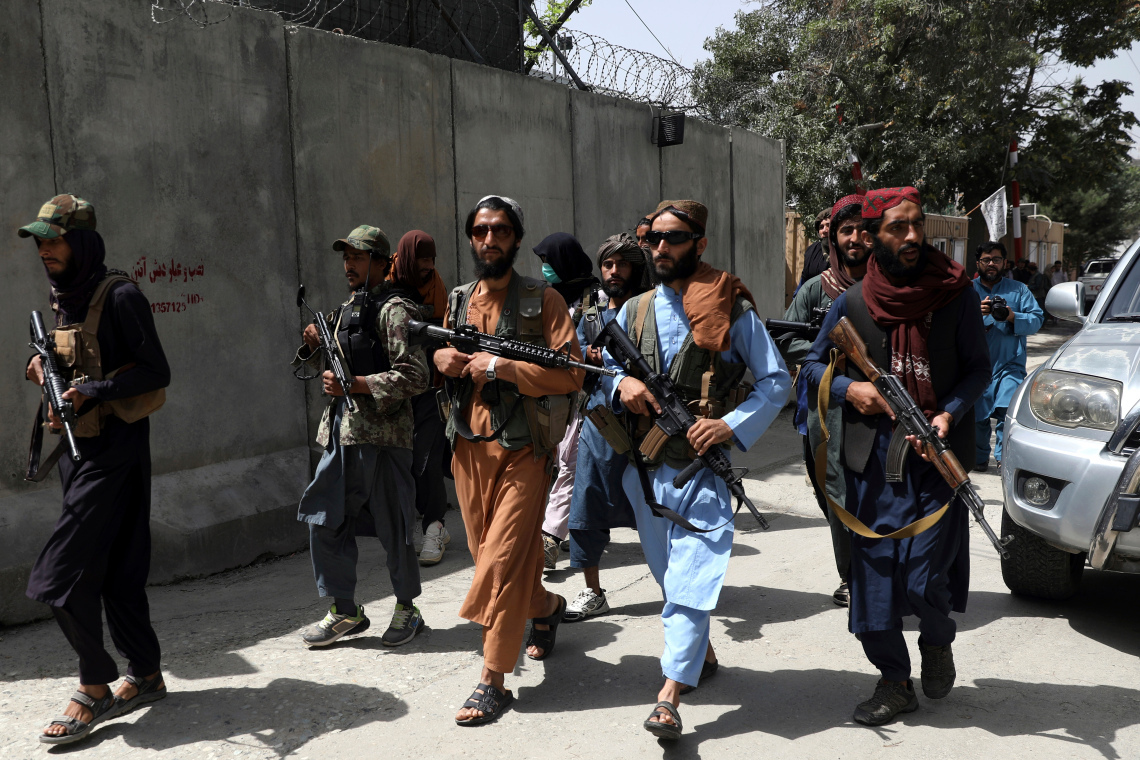
Taliban fighters patrol the streets of Kabul in August. (AP/Rahmat Gul)
Since Afghanistan fell under the control of the Taliban, CPJ has been deeply concerned for the safety of hundreds of local journalists and media workers. We have devoted our resources to helping and supporting them, even as some are already being targeted by the Taliban.
We continue to urge the United States to ensure the safety of the Afghan media by facilitating safe passage out of the country and providing emergency visas. Meanwhile, we are also working to help support the evacuations of Afghan and other journalists and are coordinating with our partners and with governments to do so. Many of the journalists who are under threat in the country are women, whose record of reporting on women’s rights has exacerbated the risk they face.
In mid-August, CPJ secured a grant from the Hollywood Foreign Press Association that we used to increase our capacity to do this work. We have hired consultants to help us process and register journalists and help us address emergency requests.
But there is still a lot of work to be done.
Today, five years after it was formed, CPJ’s Emergencies team knows exactly what is needed. The team, which is made up of experts in physical and digital safety who work in tandem with our regional staff and global correspondents, provides comprehensive, life-saving support to journalists working in hostile environments of unparalleled risk.
Here, we asked CPJ Emergencies Director Maria Salazar Ferro about CPJ’s efforts to support journalists in Afghanistan.
What is CPJ doing to help Afghan journalists?
CPJ has been working throughout the year to support Afghan journalists, but of course the past three weeks have seen an escalation in our efforts. We are trying every available avenue at this point to see if we can find safe passage for journalists, which is the most urgent need. We’re working with a coalition of media partners and with governments—including the U.S., Canada, Qatar, Ireland, Mexico, Germany, France, Colombia, and Pakistan—to find ways we can help. And, of course, we’re working with international bodies like the United Nations with a focus on finding safe passage and finding ways that journalists can be safe.
Working with media organizations and governments, we have helped support hundreds of evacuations and have directly organized dozens of them ourselves. At this point, we have supported at least 30 journalists and their families and have helped them leave the country. We have registered and vetted more than 400 journalists and have received thousands of emergency requests from others, which we are doing our best to process.
Do you think CPJ will be able to help all of the journalists under threat in Kabul?
CPJ’s Emergencies team and the organization as a whole are committed to helping journalists—not only in Kabul but also those who are working in or have worked in Afghanistan. We are finding additional ways to support those who have managed to leave—and to support those who remain.
These journalists have put their lives at risk to tell the story of Afghanistan. We know it is vital to help them continue to report the news and inform both Afghans and the international community about what’s going on inside their country.
But will all journalists get out? That's our goal. I don't know if it's going to be possible, but we're working as hard as we can.
What do you see as the future of a free press in Afghanistan?
We don’t have a crystal ball. The Taliban has made a lot of promises about allowing journalists to continue to work and allowing a free press to continue to exist, and they seem committed to changing their international image, so we will hold them accountable to the things they have said.
But given their track record with journalists—even in the past few weeks—I’m doubtful that the Afghan media will continue to be what it was just two months ago. But then again, seeing the amazing courage and resilience of the journalists we’ve been working with over the past month in Afghanistan, I don’t think this fight is over. I think there are people seriously committed to continuing to report in Afghanistan, but I think it's going to be different. It's not going to be what it was.
What do you wish people knew about the work CPJ is doing?
[Pause.] I can honestly say that I have never seen anything like this in the more than 15 years I’ve worked at CPJ.
I can see the very bad parts of this—the hundreds of journalists who have contacted us for help and their disbelief at what feels like the international community leaving them behind. But the flipside of the coin is very awesome, in the literal sense of the word. Everyone has come together as a community to help Afghan journalists. Everyone at CPJ—everyone—has joined this effort. Our correspondent in Nairobi was staying up till 2 in the morning to make calls. We had people helping from Colombia and Spain. Everyone was working to make sure we could get information out of Afghanistan and into Afghanistan.
I’m also amazed by the wider community of foreign journalists, media outlets, and our partner organizations, all of whom are going to great lengths to make sure none of their colleagues are left behind. It’s been incredible to see simultaneously such devastation and this collective of people who are willing to help simply because they believe that these journalists need support so they can tell a story that needs to be told.
I mean it. I have never, ever seen anything like this.
A lot of people want to help. What do you suggest they do?
Please consider donating to CPJ. As I said, our entire staff is working to support Afghan journalists, and your donation helps our efforts to do so.
|